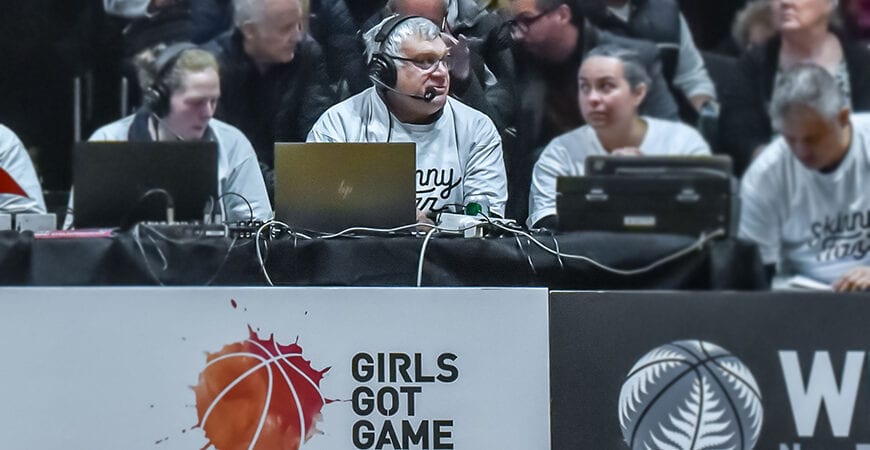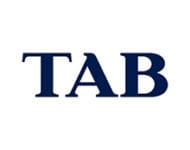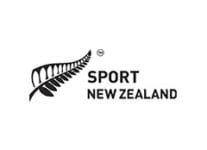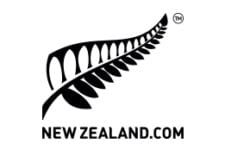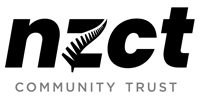There are many teams and individuals that are needed to ensure a basketball game or tournament operates seamlessly and efficiently.
Obviously, players carry the highest profile of the individuals involved, closely followed by the referees. A good table-officiating group are also key to the game running smoothly, ensuring any discrepancies involving the score or the timekeeping are resolved promptly.
Another team that play a key role are statisticians.
Historically, keeping stats was a rudimentary process, kept by hand, and with the often-lone operator sharpening his pencil after every period.
Now, stats are recorded on multiple electronic devices and made available to coaches and fans instantaneously. Whilst a willing parent will invariably be keeping stats on a tablet or a phone for junior games, it takes a team of three or four to provide the depth of information required at national tournaments, NBL games, and international fixtures.
One person who has witnessed this change and been at the forefront of the statistical movement in this country is Basketball New Zealand Lead Statistician Colin Tilley.
The Manawatu native has been recording numbers courtside for over 40 years. Cantabrian Sharon Erwood is the first New Zealander to gain FIBA’s Statisticians Educator accreditation. After attending a course in Canberra, Colin Tilley became the second Kiwi.
“It’s official recognition of being charged with the responsibility of qualifying statisticians to a FIBA standard in New Zealand. We currently have 13 or 14 people qualified to that level, but our ambition is to grow that number,” Tilley says.
Tilley first got involved with basketball when attending Palmerston North Boys’ High School.
“I played a bit of social basketball when I moved to Wellington, but it wasn’t anything serious. In the early 1980s I moved on to New Plymouth and got involved with the NBL team, which back then were called the New Plymouth Bulls and became the New Plymouth Bears in 1992.”
Whilst playing club basketball, Tilley threw himself into other aspects of the game. He refereed, did a bit of coaching, including taking on the New Plymouth Boys High School B team, and also became an administrator at club, New Plymouth Basketball Association and NBL levels, as well as running the New Plymouth stats crews.
“I general managed the 1992 2nd Division New Plymouth Royals team which was set up as a local pathway for New Plymouth basketball talent and we won the national title in our first year.
“That led on to a heavier involvement in stats at a national level with responsibility for the management and processing of the three BBNZ national leagues operating at that time and that’s when I started doing stats.
“Working closely with Ross Williams, who at the time was Basketball New Zealand CEO, the head statistician role, was further added to with the roles of League Commissioner for both the Women’s National League and the New Zealand 2nd Division until the early 2000s.
Tilley headed the Stats Crew at the 2009 FIBA Under-19 World Cup in Auckland and was a member of the stats team at the inaugural Breakers game in 2003. He held that role for 15 years, stepping down in early 2019 to focus more on his educator role with Basketball New Zealand.
Put to Tilley that he must be a bit of a stats geek, he did admit to being something of a number’s person.
“I did also keep the stats for potential Auckland men’s golf representatives for six years and various competitions managed at Manukau Golf Club during an eight-year tenure as Club Captain, so it must be in the blood somewhere.”
But right now, Tilley is focused on his BBNZ educator role.
“Up until the late 2000s, we had a strong core of statisticians in place right around the country providing quality stats services for all our league competitions, but for various reasons, and good old natural attrition, those numbers have dwindled.
“However, with the Breakers coming on board and the number of games now requiring FIBA qualified personnel increasing, we have accepted there is a need to rebuild the number of statisticians and ensure that they can operate at the highest possible level.
“Through our relationship with the Australian NBL we are able to take their information and utilise it in New Zealand.
“We are talking about processes and pathways, in the main, to make it more understandable and workable for Kiwis than for Kangaroos.
“How we are able to best operate in New Zealand is different from Australia and especially so with the advantage they have in terms of population densities and the number of game opportunities.
“They can, therefore, provide for their statisticians to get the invaluable live game experience.
“Last year in the NZ NBL and WBC games, we leap-frogged the standards we thought we could achieve by miles. There is a newfound enthusiasm amongst the group and a far superior product being presented with greater consistency.”
Tilley’s trip to Canberra in February had two objectives.
“The primary objective was to get my accreditation to be a FIBA Qualifier, but with being invited to participate in the Australian Statistician Committees annual think tank, I was also able to be part of the information flow and explore the networking possibilities. I’m pleased to say that was extremely beneficial.
“Australia are a major influence in the statistics interpretations that are adopted for world-wide use by FIBA.
“As a result of my trip, we have established good lines of communication. With further enhancing our capability and experience, we will be able to nominate officials to attend major tournaments in Australia. In addition, Australians can be nominated to attend each other’s regional and age-group tournaments when and wherever possible in the future.”
Tilley’s next assignment is to coordinate the statistician rosters for the upcoming Sal’s NBL, that’s 56 games in six weeks.
WHY BECOME A STATSITICAN?
Some people really enjoy the recording and analysis of data and it gives them a different insight into the game. Other people may simply want to stay involved in the game after they have played, coached or officiated at a high level. The reasons for becoming a statistician are many and varied and, like refereeing and score table, it can be an incredibly rewarding way to be a part of the basketball community. If you would like to learn more about joining the officials team, you can contact referees@nz.basketball.

